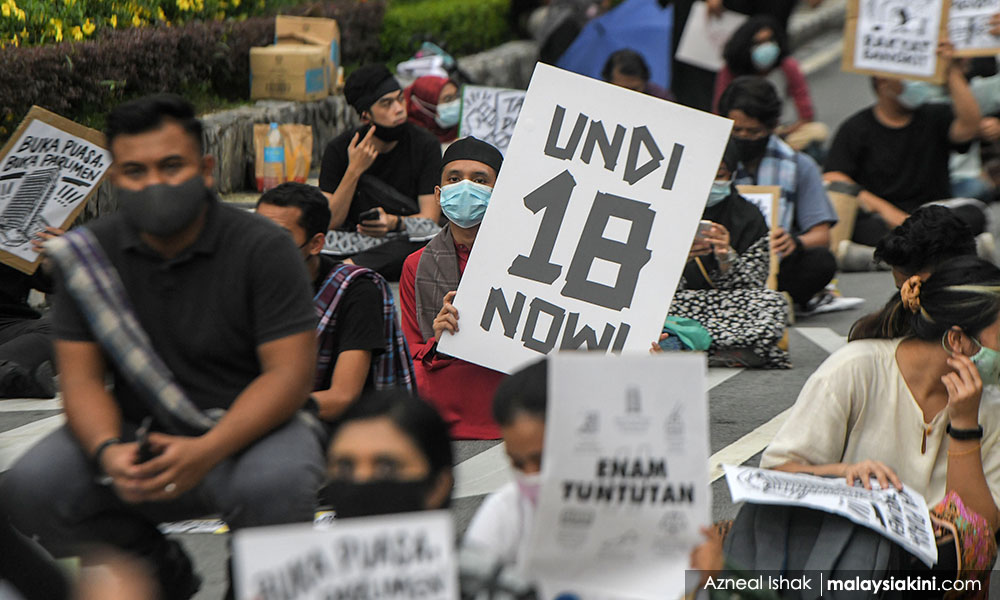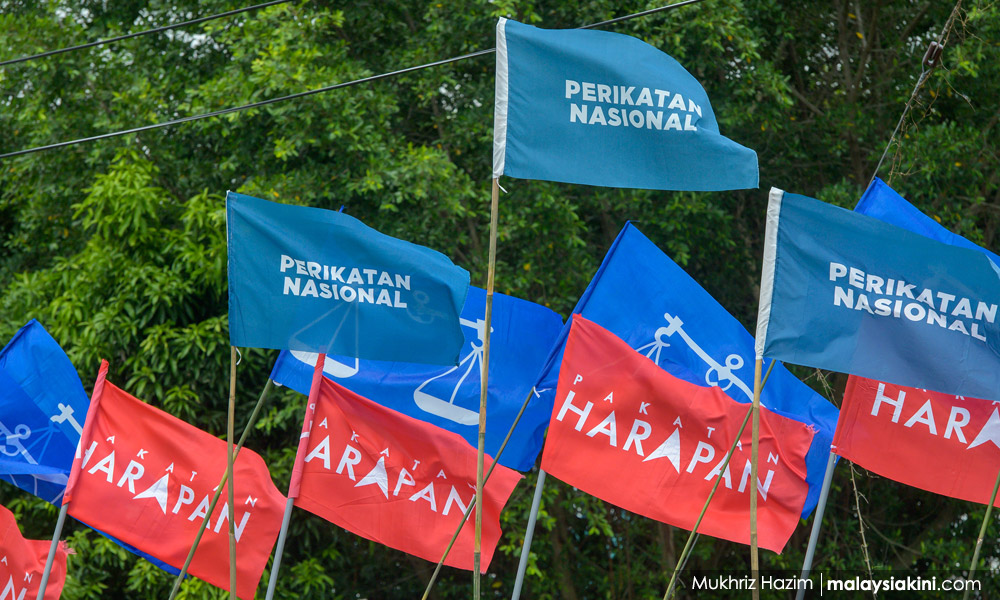COMMENT | The next general election is a more important watershed than GE14 for three reasons. First, the Covid-19 crisis has put Malaysia into a deep recession, where many Malaysians are financially suffering.
Secondly, the Sheraton Move has prompted the question of whether the nation has become more a Malay Malaysia or a more inclusive Malaysia.
Thirdly, many want justice for what they see as having the government they voted for robbed of office and replaced by a "backdoor government".
Malaysia has shown over the last few general elections that it is a deeply polarised nation. The Malay-centric parties on one side and the multi-ethnic parties on the other, subject to changing alliances from Sabah and Sarawak, are both well capable of forming a federal government after the next general election which may come as soon as early next year.
What is going to make any outcome extremely difficult to predict is the potential three-cornered electoral fights that may happen in GE15, and which we will see an example of in the coming Malacca state election.
In addition, the impact of the youth vote, when 18-year-old voters cast ballots for the first time, is not known.
Although many pundits are saying that this should benefit Pakatan Harapan, where youth votes will go and the outcome is much more complex to read.
Political scientists traditionally say that governments lose office, rather than oppositions win office.
However, in Malaysia, this is not the case. Pakatan Harapan cannot sit back and hope for the government to make mistakes to win power.
Back in 2018, Harapan had to fight hard to win the barest majority to earn the right to govern.
In the coming GE15, Harapan will have to work harder and smarter to topple the status quo conservative forces, now led by Prime Minister Ismail Sabri Yaakob in an election in which the playing field - as in the past - is very much to the advantage of the incumbent government.
Perhaps, the first and biggest hurdle Harapan needs to overcome is the sense of apathy and disillusionment among the voting public.
Harapan must give the rakyat a very good reason as to why voters should come out and vote for them. How to motivate voters so that they do not stay at home but turn out in force, and even travel to their home states as many did in GE14, is a challenge whose outcome may be dependent more on the ability to fire up and mobilise the grassroots leadership and less on the decreasing sense of public outrage over the Sheraton Move.
Pakatan through signing an MOU with the government for now appears as a collaborator in misgovernance. Further, the failure to speak out against the politically opportunistic and deeply flawed Budget 2022 presented by the government, which has been widely criticised including by Perikatan Nasional MPs, has alienated voters who are desperately wanting to see strong and articulate leadership from the opposition.
The second requirement for GE15 victory is that Harapan must campaign smart and not blindly look for syok sendiri in the urban areas in which they are likely to sweep easily.
The key to GE15 will be the mixed racial constituencies where Malays have a demographic majority but with significant numbers wanting to see change away from the present regime. The growing group of relatively independent and neutral Malays will require hard work on the ground to sway to the opposition.
Harapan lost a number of seats to Bersatu after the Sheraton Move in February 2020, along with those who left PKR following Azmin Ali's defection to Bersatu.
Before Pakatan can move forward, it has to fight to retake what was theirs in GE14. There is an enormous amount of work to be done and it must start now.
In the last election, Pakatan had the resources to count on. A dedicated Malay grassroots-focused election machine is urgently needed now.
Quality of life
The chances of an election victory appear dimmer if there is a united Bersatu, PAS, and Umno coalition emerging in the next general election.
Mathematically, such a BN-Umno clone can win unless Pakatan is able to get its message of being in a better position to take care of Malay interests through its superior policy agenda and leaders of greater integrity and moral standing.
One of the major issues for GE15 will relate to the quality of life and economic assistance in the time of this Covid-19 crisis.
Pakatan must voice the need to reform the tattered safety net systems. How to assist households manage debt, and how to put in an equitable taxation system. This has to be done in terms the Malay electorate especially can understand.
Pakatan needs to focus on poverty as the number one enemy of the rakyat and on economic recovery through good governance and an uncompromising crackdown on corruption, mismanagement, and abuse.
The election manifesto should be in terms of how Pakatan will implement reforms that will benefit ordinary Malaysians and not only is posited in terms of the big picture.
It is not enough as Pakatan did during the 2018 campaign to promise the creation of one million jobs. The people in each constituency - state and federal - need to be told precisely how they will directly benefit in their area by voting for Pakatan.
Win-win situation
Building roads, undertaking flood mitigation work, bringing electricity, providing affordable housing, initiating cost-effective projects, and resolving problems that the electorate can benefit from - these have to be part of the Pakatan reformasi message.
This is where good local candidates come in. Local candidates know the pulse of the electorate. They want to serve and need time to gain trust and confidence. This means that Harapan should settle their candidate lists early rather than later. It is time to break the conventions here.
The DAP and PKR party elections have not been encouraging for the cause of local candidates.
However, if the parties can mature and realise that it is not necessary for party officials to have a monopoly of being candidates for public office, then a win-win situation can be achieved to maximise electoral impact.
Have the popular party candidates in the party hierarchies stand but consider including independent younger newcomers and a stronger rainbow coalition to show the Malaysian public that Pakatan is rising above politics in its effort to build the best Malaysia possible for the present and future generation.
So, can Harapan achieve the above?
The voting public is somewhat uncertain about the ability of Harapan to deliver on electoral promises. It needs to be assured that Harapan will do its “homework” and avoid repeating the mistakes from the last round.
For this to happen, Harapan should establish a shadow cabinet to map out plans for launching reforms in a 100-day period; recommit to overcoming/removing the hurdles to reforms via personnel and institutional changes; and prioritise the revival of the economy
LIM TECK GHEE is a former senior official with the United Nations and World Bank.
RAMESH CHANDER is a former Chief Statistician of Malaysia and a Senior Statistical Adviser at the World Bank in Washington D.C.
MURRAY HUNTER is an independent researcher and former professor with the Prince of Songkla University and Universiti Malaysia Perlis.
The views expressed here are those of the author/contributor and do not necessarily represent the views of Malaysiakini.



